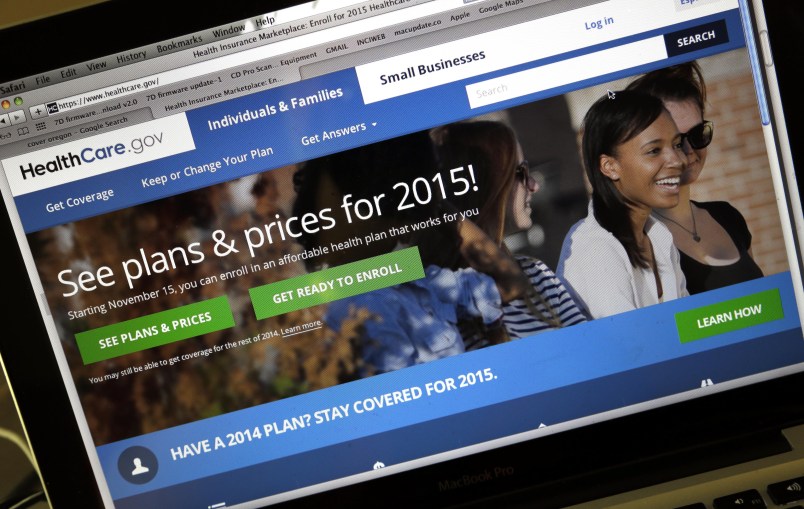A letter threatening a lawsuit has made the Obama administration an unlikely target of voting rights groups, as the president is typically seen as an ally in efforts to expand the franchise.
The groups’ concerns are colliding with another priority of Obama’s presidency: his sweeping health care law. Voting rights activists say that in rolling out Obamacare — specifically its federally operated health care exchanges — the administration hasn’t done enough to comply with the 1993 National Voter Registration Act. They are threatening to sue the administration over the alleged violations, according to a letter sent by Demos, ProjectVote and League of Women Voters of the U.S. to the White House Wednesday.
The federal law, also known as the “Motor Voter” Law, spells out the ways government services and assistance programs must provide participants the opportunity to register to vote. Because it offers enrollment in Medicaid and other public assistance, the federal exchange is one such program.
Currently, the Medicaid application form for Healthcare.gov does include a link to The National Mail Voter Registration Form, a Health and Human Services official was quick to point out to TPM with a screenshot after an initial story about the allegations was published. “Would you like to register to vote? (optional)” appears at the bottom of the enrollment screen, followed by “Click here to register to vote,” which links to the voter registration form.
 “The Administration strongly supports the goals of the NVRA and is committed to enforcing its requirements, as applicable,” Aaron Albright, a spokesman for the HHS’ Centers for Medicare and Medicaid Services, said in an email.
“The Administration strongly supports the goals of the NVRA and is committed to enforcing its requirements, as applicable,” Aaron Albright, a spokesman for the HHS’ Centers for Medicare and Medicaid Services, said in an email.
But the current configuration doesn’t meet the specific requirements in the law regarding language and other administrative mandates, the groups say.
“The almost hidden voter registration question in the ACA benefits portal does not satisfy the NVRA’s requirements,” said Demos’ senior counsel Jenn Rolnick Borchetta in an emailed statement to TPM.
For one, it doesn’t pose the option to register in the proper form, as required by the law, a form that is believed to be a more effective way of engaging applicants, according to the groups. It also does not include language informing applicants of their rights in regards to registering to vote, and that their choice to register will not affect the public benefits they’re seeking, the groups said.
Voting rights groups also took issue with other aspects of how HHS was approaching the Motor Voter Law’s registration requirements, such as the fact that the enrollment screen links to a form that is 25 pages long and requires a printer. Technically this isn’t a violation, they said, but shows the process to register is too burdensome.
When asked specifically about these concerns, Albright of HHS declined to comment further.
Sarah Brannon, director of Project Vote’s Government Agency Voter Registration Program, told TPM her group has had multiple conversations with federal officials about making the changes. “They have not given us any formal response or explantation,” she said.
Back in 2013, when the law was still being implemented, similar concerns were raised, particularly with the state exchanges.
Representatives from the voting rights groups told TPM that for the most part states have been more receptive than the administration to the concerns they’ve raised about NVRA compliance and have been engaged in working with them. The activists offered examples of state exchange pages to show what proper compliance looks like.

“The states have been extremely cooperate and have made huge headway to make the voting registration compliant with the NVRA,” she said.







This seems very odd. Does anyone know why this hasn’t been fixed? No one’s job? I am surprised an disappointed.
Hah, this sounds like a classic case of “Make me do it.”
this seems bizarre…so, there is a link to register to vote available on the site, but it’s not obvious enough? Is that the beef? When I was in between jobs, and going back to school, I used healthcare.gov, and noticed it. Furthermore, for all the over the top bs the initial rollout received, lost in all that hub bub was how awesomely efficient the help desk is. I never waited more than a minute for someone to answer, when I needed assistance. Seems if people looking to register are having difficulty locating it, they can just make a call, the number is in plain sight, and get help, rather easily. I get the argument that it would aid registration if there was a giant banner ad, for example, but a lawsuit seems harsh, and dragging Obama’s name through the mud, when he’s championed this cause, seems needless. Seems to me, that instead of this course of action, they can just direct people looking to register to the phone number for the help desk. Am I missing the bigger picture here?
Yes, these groups are generally friendly to the administration, and it seems they want to promote a more accessible means of voter registration – a pursuit I am sure the Obama administration agrees with.
If forced by a judge to make adjustments to meet a more stringent standard of voter accessibility, I am sure they would happily comply.
Probably just drawing it to their attention would have been sufficient.
My $0.02 - if these organizations have limited staff and financial resources (as most nonprofits do) they ought to be going full-scale against the real Voting Rights Acts enemies with nonstop publicity and education campaigns.